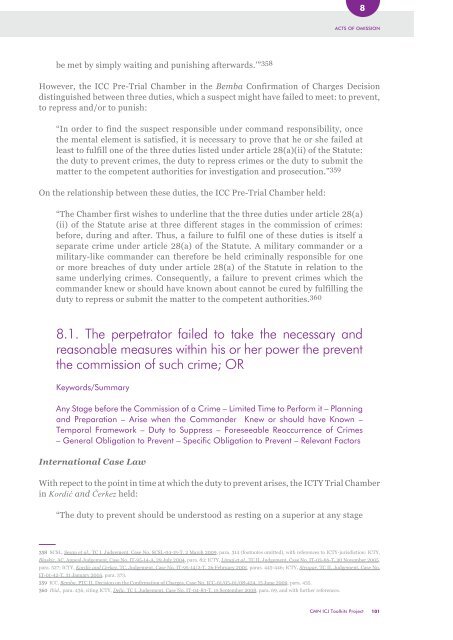Command Responsibility
CMN_ICL_Guidelines_Command_Responsibility_En
CMN_ICL_Guidelines_Command_Responsibility_En
Create successful ePaper yourself
Turn your PDF publications into a flip-book with our unique Google optimized e-Paper software.
8<br />
ACTS OF OMISSION<br />
be met by simply waiting and punishing afterwards.’” 358<br />
However, the ICC Pre-Trial Chamber in the Bemba Confirmation of Charges Decision<br />
distinguished between three duties, which a suspect might have failed to meet: to prevent,<br />
to repress and/or to punish:<br />
“In order to find the suspect responsible under command responsibility, once<br />
the mental element is satisfied, it is necessary to prove that he or she failed at<br />
least to fulfill one of the three duties listed under article 28(a)(ii) of the Statute:<br />
the duty to prevent crimes, the duty to repress crimes or the duty to submit the<br />
matter to the competent authorities for investigation and prosecution.” 359<br />
On the relationship between these duties, the ICC Pre-Trial Chamber held:<br />
“The Chamber first wishes to underline that the three duties under article 28(a)<br />
(ii) of the Statute arise at three different stages in the commission of crimes:<br />
before, during and after. Thus, a failure to fulfil one of these duties is itself a<br />
separate crime under article 28(a) of the Statute. A military commander or a<br />
military-like commander can therefore be held criminally responsible for one<br />
or more breaches of duty under article 28(a) of the Statute in relation to the<br />
same underlying crimes. Consequently, a failure to prevent crimes which the<br />
commander knew or should have known about cannot be cured by fulfilling the<br />
duty to repress or submit the matter to the competent authorities. 360<br />
8.1. The perpetrator failed to take the necessary and<br />
reasonable measures within his or her power the prevent<br />
the commission of such crime; OR<br />
Keywords/Summary<br />
Any Stage before the Commission of a Crime – Limited Time to Perform it – Planning<br />
and Preparation – Arise when the <strong>Command</strong>er Knew or should have Known –<br />
Temporal Framework – Duty to Suppress – Foreseeable Reoccurrence of Crimes<br />
– General Obligation to Prevent – Specific Obligation to Prevent – Relevant Factors<br />
International Case Law<br />
With repect to the point in time at which the duty to prevent arises, the ICTY Trial Chamber<br />
in Kordić and Čerkez held:<br />
“The duty to prevent should be understood as resting on a superior at any stage<br />
358 SCSL, Sesay et al., TC I, Judgement, Case No. SCSL-04-15-T, 2 March 2009, para. 314 (footnotes omitted), with references to ICTY-jurisdiction: ICTY,<br />
Blaskic, AC, Appeal Judgement, Case No. IT-95-14-A, 29 July 2004, para. 83; ICTY, Limaj et al., TC II, Judgement, Case No. IT-03-66-T, 30 November 2005,<br />
para. 527; ICTY, Kordic and Cerkez, TC, Judgement, Case No. IT-95-14/2-T, 26 February 2001, paras. 445-446; ICTY, Strugar, TC II, Judgement, Case No.<br />
IT-01-42-T, 31 January 2005, para. 373.<br />
359 ICC, Bemba, PTC II, Decision on the Confirmation of Charges, Case No. ICC-01/05-01/08-424, 15 June 2009, para. 435.<br />
360 Ibid., para. 436, citing ICTY, Delic, TC I, Judgement, Case No. IT-04-83-T, 15 September 2008, para. 69, and with further references.<br />
CMN ICJ Toolkits Project<br />
101


